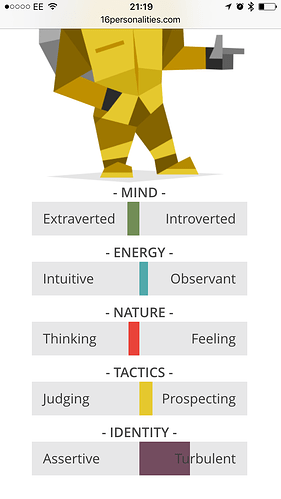It’s a difficult experiment to do. One argument usually given is that the participants would be influenced by the answers already given in whichever their first condition was. But definitely an interesting research question.
Please use correct induction for the proof.
- my math prof -
That isnt mathematical induction, its a proof by reasoning which i cant for the life of me remember the name of.
Set aside that that this was a “could be quote” from my prof^^
You couldn’t use induction to disproof the statement anyway^^ I suppose you could use it to proof it, if the statement were right in the first place.
And yes what he did was just common sense “reasoning”^^
I think that is largely more related to having Apserger’s (or close to at least) being an INTP probably doesn’t help though.
INTP’s often just have a lot of trouble of expressing their own feeling and reacting to others. Where as Asperger’s is basically affecting emotions and how you percive them.
About the test: I can with reasonable safety say that I am INTP both because I have taken those tests quite a few times and because one of my friends (and me) both made an analysis e my personality for the heck of it.
Yeah, Zouls is right. I was basically just quickly showing that there are counter-examples and that even though some individuals may not be influenced at all by external factors during personality tests, others are, which (in addition to @olihax’s points above) leads most personality tests to be considered unreliable even if they may have surprising accuracy ^.^
My answer was more a joke noone seems to get >.<
But you’d only need one counter-example anyway so your disproof is mathematically correct^^ kinda xD
Isnt it just because of a psychological principle? i cant remember the name but they use it for fortune telling, its a sort of ‘‘if you make things broad enough it will seem to be the truth’’
in this case though while i wouldnt trust the % values the actual archetypes are quite fitting.
Just like Horoscopes!
Id argue that the % value categories are the more robust measurement those archetypes seem to be formed from opinion by the website, they resemble the big 5 personality test categories. If you want a cool personality test website, looks a bit boring but they are legitimate psychology tests used by researchers:
go here http://similarminds.com/personality_tests.html .
Look for the Big five personality test.
i dont believe that, you can look at the bottom of the site they allow you to look through their theory and several studies they have done to make it more fitting, not saying it should be trusted completely, but i really dont think you can say its just based on ‘‘an opinion by the website’’ if it was nothing but an opinion then it wouldnt fit so much.
Myers-Briggs personality tests are often ok accurate, their usefulnes is debatable though as the personalities are relatively broad and based on archetypes.
They’re still not as reliable as researchers would like though. The only personality test I know of that is generally agreed upon to be trustworthy and reliable enough to use in clinical settings is the Minnesota Multiphasic Personality Inventory. Had a professor tell several stories about people trying to fake the test and it’s supposedly impossible to fake. It kind of forces you to answer honestly, at least according to him.
And @Zouls are you thinking of confirmation bias?
that sounds quite unbelieveable or like some crazy type of reverse psychology.
Nope, Found it, its called ‘‘Barnum effect’’ or ‘‘Forer effect’’
‘‘The Barnum effect, also called the Forer effect, is the observation that individuals will give high accuracy ratings to descriptions of their personality that supposedly are tailored specifically for them, but are in fact vague and general enough to apply to a wide range of people. This effect can provide a partial explanation for the widespread acceptance of some beliefs and practices, such as astrology, fortune telling, graphology, aura reading and some types of personality tests’’
They include variants of the same question in reverse orders and perspectives, so if you try to answer in a way that is ‘preferable’ then you can see that in the scores. They also include a test of how likely you are to select perfect responses like, I would never keep a twenty pound/dollar note I found on the street, even if no one saw. If you say strongly agree to a large number to these types of questions then the researcher knows you are someone who is likely to fake other aspects of the test.
Interesting, sources?
Yeah, but it is some of the best general personality tests you can find of the internet ![]()
But if you really want to be sure about the result, find a document about Meyers-Briggs and find the personality that fits you best. ![]()
With such a low percentage I would guess that it didn’t ask the right questions or you don’t fit into the standard types.
As the percentage easily can swing up to 20% based on how you feel right now, I wouldn’t put much into it 
But at least the Turbulenz side is true xD
Yeah i thought about that as soon as i saw it, quite fitting in more ways than one
